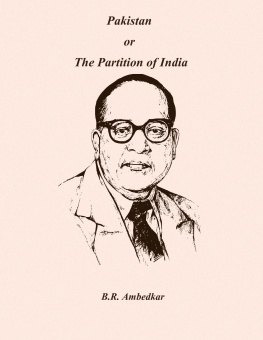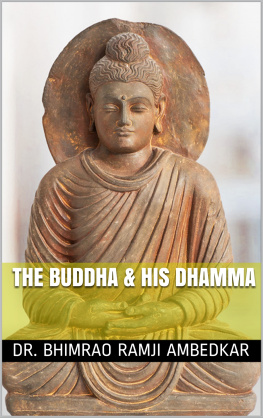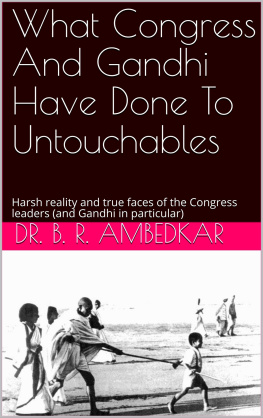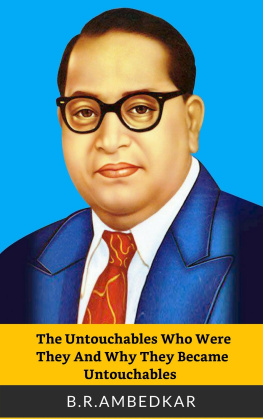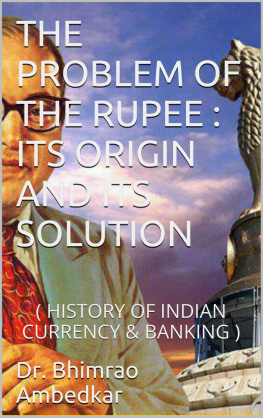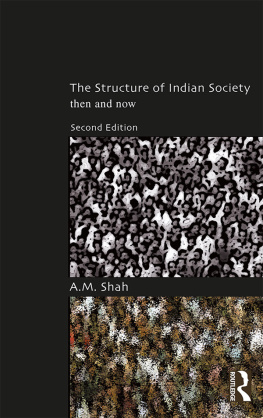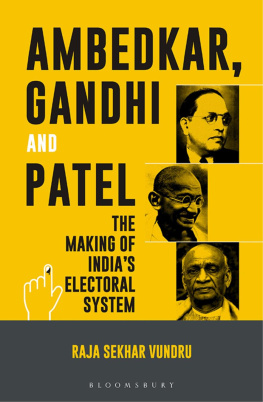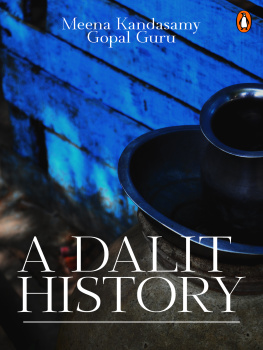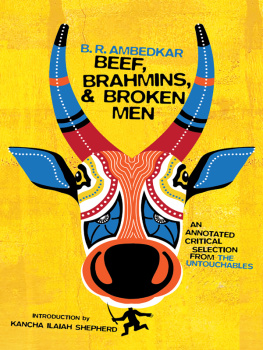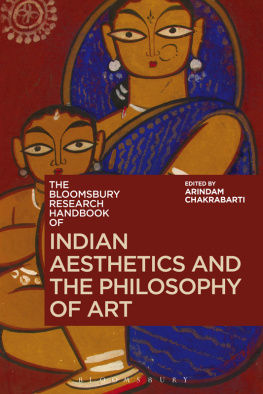THE UNTOUCHABLES WHO WERE THEY AND WHY THEY
BECAME
UNTOUCHABLES ?
B.R. AMBEDKAR
Inscribed to the memory of
NANDNAR
RAVIDAS
CHOKHAMELA
THREE RENOWNED SAINTS WHO WERE BORN AMONG THE UNTOUCHABLES AND WHO BY THEIR PIETY AND VIRTUE WON THE ESTEEM OF ALL.
CONTENTS
: A COMPARATIVE SURVEY
Untouchability Among Non-Hindus
Untouchability Among Hindus.
: PROBLEM OF HABIT
Why do the Untouchables Live Outside The Village?
Are The Untouchables Broken Men ?
Are There Parallel Cases ?
How Did Separate Settlements For Broken Men Disappear Elsewhere ?
: OLD THEORIES OF THE ORIGIN OF UNTOUCHABILITY
Racial Difference as the Origin of Untouchability
Occupational Origin Of Untouchability
: NEW THEORIES OF THE ORIGIN OF THE UNTOUCHABILITY Contempt for Biddhist as the root of Untouchability Beaf-eating as the root of Untouchability
: THE NEW THEORIES AND SOME HARD QUESTIONS
Did the Hindus Never Eat Brief? Why Did Non-Brahmins Give Up Beef-Eating? What Made the Brahmins Vegetarians? Why Should Beef-Eating Make Broken Men Untouchables?
PREFACE
This book is a sequel to my treatise called The ShudrasWho they were and How they came to be the Fourth Varna of the Indo-Aryan Society which was published in 1946. Besides the Shudras, the Hindu Civilisation has produced three social classes whose existence has not received the attention it deserves. The three classes are :-
(i) The Criminal Tribes who number about 20 million or so;
(ii) The Aboriginal Tribes who number about 15 millions; and
(iii) The Untouchables who number about 50 millions.
The existence of these classes is an abomination. The Hindu Civilisation, gauged in the light of these social products, could hardly be called civilisation. It is a diabolical contrivance to suppress and enslave humanity. Its proper name would be infamy. What else can be said of a civilisation which has produced a mass of people who are taught to accept crime as an approved means of earning their livelihood, another mass of people who are left to live in full bloom of their primitive barbarism in the midst of civilisation and a third mass of people who are treated as an entity beyond human intercourse and whose mere touch is enough to cause pollution? In any other country the existence of these classes would have led to searching of the heart and to investigation of their origin. But neither of these has occurred to the mind of the Hindu. The reason is simple. The Hindu does not regard the existence of these classes as a matter of apology or shame and feels no responsibility either to atone for it or to inquire into its origin and growth. On the other hand, every Hindu is taught to believe that his civilisation is not only the most ancient but that it is also in many respects altogether unique. No Hindu ever feels tired of repeating these claims. That the Hindu Civilisation is the most ancient, one can understand and even allow. But it is not quite so easy to understand on what grounds they rely for claiming that the Hindu Civilisation is a unique one. The Hindus may not like it, but so far as it strikes non-Hindus, such a claim can rest only on one ground. It is the existence of these classes for which the Hindu Civilisation is responsible. That the existence of such classes is a unique phenomenon, no Hindu need repeat, for nobody can deny the fact. One only wishes that the Hindu realised that it was a matter for which there was more cause for shame than pride. The inculcation of these false beliefs in the sanity, superiority and sanctity of Hindu Civilisation is due entirely to the peculiar social psychology of Hindu scholars.
Today all scholarship is confined to the Brahmins. But unfortunately no Brahamin scholar has so far come forward to play the part of a Voltaire who had the intellectual honesty to rise against the doctrines of the Catholic Church in which he was brought up; nor is one likely to appear on the scene in the future. It is a grave reflection on the scholarship of the Brahmins that they should not have produced a Voltaire. This will not cause surprise if it is remembered that the Brahmin scholar is only a learned man. He is not an intellectual. There is a world of difference between one who is learned and one who is an intellectual. The former is class-conscious and is alive to the interests of his class. The latter is an emancipated being who is free to act without being swayed by class considerations. It is because the Brahmins have been only learned men that they have not produced a Voltaire.
Why have the Brahmins not produced a Voltaire? The question can be answered only by another question. Why did the Sultan of Turkey not abolish the religion of the Mohammedan World? Why has no Pope denounced Catholicism? Why has the British Parliament not made a law ordering the killing of all blue-eyed babies?
The reason why the Sultan or the Pope or the British Parliament has not done these things is the same as why the Brahmins have not been able to produce a Voltaire. It must be recognised that the selfish interest of a person or of the class to which he belongs always acts as an internal limitation which regulates the direction of his intellect. The power and position which the Brahmins possess is entirely due to the Hindu Civilisation which treats them as supermen and subjects the lower classes to all sorts of disabilities so that they may never rise and challenge or threaten the superiority of the Brahmins over them. As is natural, every Brahmin is interested in the maintenance of Brahmanic supremacy be the orthodox or unorthodox, be he a priest or a grahastha, be he a scholar or not. How can the Brahmins afford to be Voltaires? A Voltaire among the Brahmins would be a positive danger to the maintenance of a civilisation which is contrived to maintain Brahmanic supremacy. The point is that the intellect of a Brahmin scholar is severely limited by anxiety to preserve his interest. He suffers from this internal limitation as a result of which he does not allow his intellect full play which honesty and integrity demands. For, he fears that it may affect the interests of his class and therefore his own.
But what annoys one is the intolerance of the Brahmin scholar towards any attempt to expose the Brahmanic literature. He himself would not play the part of an iconoclast even where it is necessary. And he would not allow such non-Brahmins as have the capacity to do so to play it. If any non-Brahmin were to make such an attempt the Brahmin scholars would engage in a conspiracy of silence, take no notice of him, condemn him outright on some flimsy grounds or dub his work useless. As a writer engaged in the exposition of the Brahmanic literature I have been a victim of such mean tricks.
Notwithstanding the attitude of the Brahmin scholars, I must pursue the task I have undertaken. For the origin of these classes is a subject which still awaits investigation. This book deals with one of these unfortunate classes
namely, the Untouchables. The Untouchables are the most numerous of the three. Their existence is also the most unnatural. And yet there has so far been no investigation into their origin. That the Hindus should not have undertaken such an investigation is perfectly understandable. The old orthodox Hindu does not think that there is anything wrong in the observance of untouchability. To him it is a normal and natural thing. As such it neither calls for expiation nor explanation. The new modern Hindu realises the wrong. But he is ashamed to discuss it in public for fear of letting the foreigner know that Hindu Civilisation can be guilty of such a vicious and infamous system or social code as evidenced by Untouchability. But what is strange is that Untouchability should have failed to attract the attention of the European student of social institutions. It is difficult to understand why. The fact, however, is there. This book may therefore, be taken as a pioneer attempt in the exploration of a field so completely neglected by everybody. The book, if I may say so, deals not only with every aspect of the main question set out for inquiry, namely, the origin of Untouchability, but it also deals with almost all questions connected with it. Some of the questions are such that very few people are even aware of them; and those who are aware of them are puzzled by them and do not know how to answer them. To mention only a few, the book deals with such questions as : Why do the Untouchables live outside the village?


